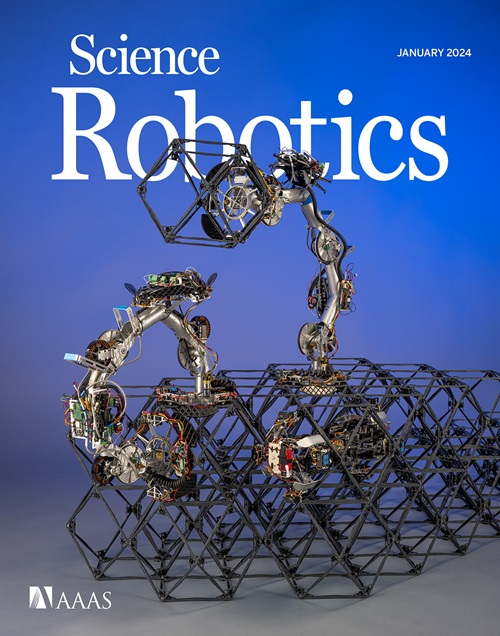Monte Carlo tree search with spectral expansion for planning with dynamical systems
IF 27.5
1区 计算机科学
Q1 ROBOTICS
引用次数: 0
Abstract
The ability of a robot to plan complex behaviors with real-time computation, rather than adhering to predesigned or offline-learned routines, alleviates the need for specialized algorithms or training for each problem instance. Monte Carlo tree search is a powerful planning algorithm that strategically explores simulated future possibilities, but it requires a discrete problem representation that is irreconcilable with the continuous dynamics of the physical world. We present Spectral Expansion Tree Search (SETS), a real-time, tree-based planner that uses the spectrum of the locally linearized system to construct a low-complexity and approximately equivalent discrete representation of the continuous world. We prove that SETS converges to a bound of the globally optimal solution for continuous, deterministic, and differentiable Markov decision processes, a broad class of problems that includes underactuated nonlinear dynamics, nonconvex reward functions, and unstructured environments. We experimentally validated SETS on drone, spacecraft, and ground vehicle robots and one numerical experiment, each of which is not directly solvable with existing methods. We successfully show that SETS automatically discovers a diverse set of optimal behaviors and motion trajectories in real time.
带谱展开的蒙特卡罗树搜索用于动态系统规划
机器人通过实时计算来规划复杂行为的能力,而不是坚持预先设计或离线学习的例程,减轻了对每个问题实例的专门算法或训练的需要。蒙特卡罗树搜索是一种强大的规划算法,可以策略性地探索模拟未来的可能性,但它需要一个离散的问题表示,这与物理世界的连续动态不可调和。我们提出了谱展开树搜索(SETS),这是一种实时的、基于树的规划器,它使用局部线性化系统的谱来构建连续世界的低复杂度和近似等效的离散表示。我们证明了set收敛于连续的、确定的、可微的马尔可夫决策过程的全局最优解的一个界,马尔可夫决策过程是一类广泛的问题,包括欠驱动的非线性动力学、非凸奖励函数和非结构化环境。我们在无人机、航天器和地面车辆机器人上对SETS进行了实验验证,并进行了一个数值实验,每个实验都不能用现有方法直接求解。我们成功地证明了SETS可以实时自动发现各种最优行为和运动轨迹。
本文章由计算机程序翻译,如有差异,请以英文原文为准。
求助全文
约1分钟内获得全文
求助全文
来源期刊

Science Robotics
Mathematics-Control and Optimization
CiteScore
30.60
自引率
2.80%
发文量
83
期刊介绍:
Science Robotics publishes original, peer-reviewed, science- or engineering-based research articles that advance the field of robotics. The journal also features editor-commissioned Reviews. An international team of academic editors holds Science Robotics articles to the same high-quality standard that is the hallmark of the Science family of journals.
Sub-topics include: actuators, advanced materials, artificial Intelligence, autonomous vehicles, bio-inspired design, exoskeletons, fabrication, field robotics, human-robot interaction, humanoids, industrial robotics, kinematics, machine learning, material science, medical technology, motion planning and control, micro- and nano-robotics, multi-robot control, sensors, service robotics, social and ethical issues, soft robotics, and space, planetary and undersea exploration.
 求助内容:
求助内容: 应助结果提醒方式:
应助结果提醒方式:


